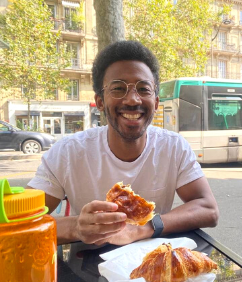Student Spotlight: Kevin Kuate Fodouop ’23
Jacobson Scholar;
Furman Academic Scholar;
Latham and Watkins Award in Technology and Law;
Joyce Lowinson IILJ Research Scholar;
Nordlicht Family Law and Social Entrepreneurship Scholar;
NYU School of Law Dean's Scholar
What drew you to NYU Law?
Three things drew me to NYU: academic excellence, student culture, and unbeatable location. When evaluating law schools, I extensively researched their academic offerings, research centers, and professors within my areas of interest (tech law, antitrust, IP). Even among top tier schools, NYU distinguished itself with its all-star faculty, its focus on interdisciplinarity, and research centers that directly spoke to my interests. The student culture also seemed to be a perfect fit for me: NYU has a reputation for being more laid back and collaborative than what you would generally expect of law schools. This reputation proved to be totally accurate. Last but not least, NYU is located in the best location I could imagine for studying law. In the middle of Greenwich Village, we have access to the best of New York City’s legal industry and fun lifestyle.
What has been the best surprise about your law school experience?
The best surprise for me has been how collaborative, welcoming, and inclusive my law school experience has felt. Law school has a general reputation for being a cutthroat environment. But even during the height of the pandemic, I found the atmosphere at NYU to be one of genuine camaraderie. I formed 1L study groups with friends where we addressed each others’ confusions and helped each other cope with the (unavoidable) pressure of 1L. The Law Review, which I expected to be formalistic and somewhat elitist, instantly proved to be an inclusive and fun community. And every law professor I have reached out to has been eager to learn about my story and help as much as they could. As an international student, I also have found a great amount of support from the law school in figuring out my path into the American legal industry.
What first inspired you to pursue a career in law?
Before law school, I worked in the technology industry for six years. Early on, I dealt with heavily regulated technology products—raising information privacy and security concerns. I grew increasingly interested in the intersection between technology, law, and policy. Questions about the role of law and civil society in stirring technological innovation towards social good and mitigating its unintended harms appeared to me as among the most critical issues of our time. This realization inspired me to pursue law with the hope of contributing my technology experience and my passion for these issues as a lawyer, policy expert, and/or scholar down the line.
Tell me about your roles as President of Rights Over Tech and Co-President of Asia Law Society.
I found two great NYU Law student communities which I’m passionate about: Rights over Tech and the Asia Law Society. Rights over Tech helps students learn more about and contribute to the very issues that brought me to law school: how can we stir the impact of technology towards social good and mitigate its harm to human and civil rights. As president, I mainly serve as a coordinator: we have an active community and a flat board structure. Board members are empowered to organize the events they want to champion, and any student can sign up to lead a discussion on the topic of their choice during our weekly “Can We Talk About... ” meeting. I joined the Asia Law Society out of my personal interest for Asia—China in particular, because my mother is from Hong Kong—as well as its culture and its economic and technological dynamics. ALS throws events on legal careers in Asia, Asia law academic topics, and our flagship event is a delegation trip to an Asian country (next, we are going to Singapore!).
What has been your favorite law school class so far?
My favorite class has been Torts with Professor Catherine Sharkey. Tort law pervades all aspects of life in society, and after taking this class you think differently about trying new products, or even crossing the street or driving (who is liable for a potential accident?)! I enjoyed the policy debates that the class fostered and the law and economics framework that sees torts law as a tool to build incentives for individuals and corporations. I also really liked contrasting the roles of torts and government regulation in ordering human affairs, which is one of Professor Sharkey’s areas of expertise.
Posted on December 6, 2021


